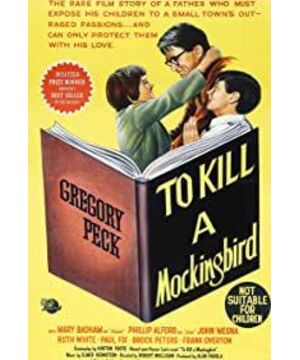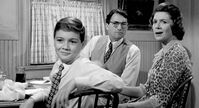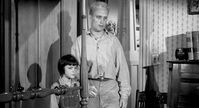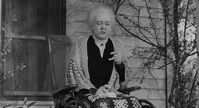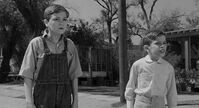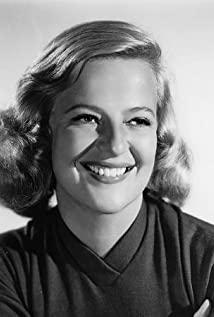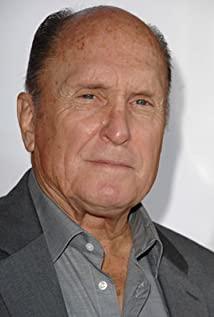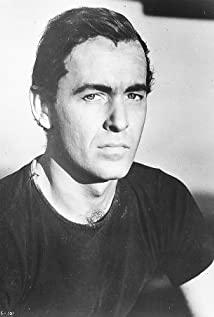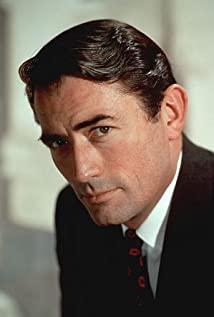1. The first movie hero in a century. In 2003, the American Film Institute selected 50 heroes and 50 villains in movie history in the past 100 years. In 1962, Gregory Pike was featured in the film "Kill a Rebellious Bird" (Gregory Peck) played by Atticus Finch, the lawyer, became the first big screen hero in the century of film, overpowering James Bond and Indiana Jones. Parker once claimed that his favorite film was "Roman Holiday," but he added that only "Killing a Rebellion" is "closest to his heart and the peak of his acting career." The background of the film is During the Great Depression in the mid-1930s. Finch is a highly educated lawyer in Meigang, Alabama, in the southern United States. He comes from a middle-class family and his wife has died. With the help of a black maid, Kabunia, he takes care of a pair of children: Jim and Si. Cott. Vinci is calm and wise, humorous, upright, full of morality, and often advocates rights and justice for the poor regardless of remuneration. His firm belief in equality has made him one of the few people who oppose racial discrimination in the small town, insisting on and committing to racial equality regardless of personal safety. Black Tom Robinson was accused of raping a white woman. Finch was commissioned by the District Court to serve as Tom’s defense lawyer. This has a heroic brilliance in an era when racial discrimination is very common and serious. Of course, he himself and his family have become the target of the racist residents to vent their anger. Parker died on June 11, 2003. The New York Times stated in his obituary: "Parker and Finch are a perfect hybrid." Parker himself is an active participant in sympathizing with the black civil rights movement. When he learned that Robert Mulligan, the director of "Killing a Rebel", was the candidate for "Finch", he said happily: "I am happy to follow my fate. . I feel that I can identify with the character without much effort, and I can be in the position of Vinci without any performance. At the same time, I feel as if I completely recognize the two children." Indeed, it is difficult to find in the film. Traces of Parker's performance, he is the lawyer Finch, he is the father of Jim and Scott. 2. The novel "To Kill a Mockingbird" ("To Kill a Mockingbird") is adapted from the novel "To Kill a Mockingbird" released in 1960 by the American writer Niel Harper Lee. As soon as the novel was published, it achieved great success and became a classic of modern American literature. The following year, the work won the Pulitzer Prize for Fiction. Atticus Finch is considered the most immortal novel image of racial justice. "Killing an Antitongue" has an insightful description of American clanism, including race, class, and religion. It involves serious issues of racial discrimination and abuse of innocence, but the style of writing is humorous, simple and warm. The great reason is due to the children's narrative angle of the novel-Vinci's daughter Scott-and the childish perspective and language of the novel, which makes the entry barrier of this story not high. Sko is a lively, non-sentimental, and a great narrator. She is eloquent, eloquent, and has a childish humor. With the deepening of the plot, the story gradually became deep and heavy, especially through the description of the confrontation and brutal venting of the racially inequalities in Meigang Town, the social criticism of the work was highlighted. Although the author Harper Lee hides behind the little girl Scott and leaves the room for understanding and conclusions to the reader, he is undoubtedly courageous to face social and political issues. When Tom was asked why he was afraid since he was not guilty, he said: "If you are also a black person like me, you will be afraid too."-Black is equal to sin. Reality is the most powerful critic of reality. "Assumptions, worst assumptions: all blacks are lying, all blacks are immoral and untrustworthy, even women, then this society will completely lose equality." Finch said sadly in the court. He urged the prosecutors and juries to respect the facts, uphold the dignity and equality of human beings and the law, and let the court, the most important balance of the country, treat everyone equally without prejudice, "Do your responsibilities in the name of God; In the name of God, trust Tom!" But apparently, Finch alone could not shake the ills of the system and the mountains of prejudice. In English-speaking countries, "Killing an Anti-tongue Bird" is often included in school textbooks. It is probably the most widely read book on racism in the United States in the 20th century. 3. "Mockingbird" in "To Kill a Mockingbird", "Mockingbird" in "To Kill a Mockingbird", the Latin name is "Mimus polyglottos", and the Chinese name is "Little Mockbird", or called it "Anti-tongue bird", "mocking bird". Mainly active in the vicinity of Texas in the United States, as well as in Canada and the Caribbean, it is a bird that is good at imitating various sounds, so Finch said that the antitongue bird just sings to us with their hearts. Vinci was a sharpshooter when he was young, and he advised children who used air guns to shoot birds: "You can fight bluejays, but remember that it is a sin to kill the repellent." A very common bird, usually considered a cruel pest. In a metaphorical sense, "killing a rebellious bird" means killing an innocent person. The "anti-tongue bird" in the work refers to both Arthur Bu Radley and Tom. The former rarely appears in novels and movies. According to legend, he was disfigured by his cruel father, his appearance was terrifying, and he appeared at night. In the minds of children, cloth is synonymous with "demon". But in addition to constantly placing all kinds of mysterious and obsolete gifts for the children in a tree hole, Boo also stitched up Jem’s pants. When Bob Ewell retaliated against Scott and Jem, he fought hard to take pictures. save. Tom was originally an honest black man working on a plantation and helpful, but he was framed for rape. During the trial, Finch proved that Tom was disabled with his left hand since he was a child, and he was completely incapable of violent attacks on Meala. Through the trial, the facts have actually become clear: Meyara attempted to seduce Tom, was discovered by his father Bob, was beaten up by his father, and then falsely accused Tom. The Ewells are one of the poorest white families in the town, and Bob is an alcoholic, almost a representative of the scum of the town, but they are white, so they can easily falsely accuse a black man without a medical certificate. Tom was found guilty, desperate to appeal, and shot dead while escaping. The fate of this "anti-tongue bird" has exposed the darkness of the racial discrimination policy. To be guilty and lose one's life for the skin color is undoubtedly that evil swallows the good and the innocent. In many Chinese versions, the translation of "mockingbird" as "birds" is a mistranslation. 4. Liu Yu of the black civil rights movement wrote in "Details of Democracy—The Four Fundamental Principles of the United States": "Every country has its own scars. One of the biggest scars of American politics is its race. The issue of ism.” Racism can be said to be the most serious crime in the United States. Until the early 1950s, black Americans had to give up their front seats to whites on buses. In Montgomery in 1955, blacks opposed the black-and-white segregation measures on buses with a total strike. The peak of the black civil rights movement appeared in August 1963. The leader of the civil rights movement, Dr. Martin Luther King, delivered his famous speech "I have a dream" to 250,000 people in the square in front of the Lincoln Memorial in Washington. "—Dr. King keeps repeating his vision that blacks and whites can one day coexist peacefully and equally. The public opinion pressure generated by the rally finally forced the U.S. Congress to pass the "Civil Rights Act of 1964" in the following year, declaring segregation and discrimination policies as illegal, thus ending the long-term black and white segregation policy of the United States since its independence. This shows that before the "Civil Rights Act of 1964" was promulgated, the appearance of literary and film works such as "Killing a Rebellious Bird" was so significant. A great work coexists with a great era. In the "New York Times" Vinci's obituary, it also mentioned the stalemate relationship between this work and that era: "("Killing a Anti-tongue Bird") sincerely opposed racial discrimination and social injustice. At that time, citizens The rights movement is beginning to arouse the attention of the whole nation." The Library of Congress considers "Killing a Rebellious Bird" as a "culturally important" film. The "antitongue bird" is like a timekeeping bird to the American civil rights movement. In the second year that Parker won the Oscar for "Best Actor" for the role of Vinci, in 1964, Sidney Poitier became the first in Oscar history with "Lilies in the Field" A black actor. One black and one white also fully demonstrated the radical liberal political intentions of Hollywood at that time. Liu Yu also wrote in the aforementioned article: "If you watch Hollywood movies carefully, you will find that directors generally dare not easily portray blacks as negative images... Blacks always represent a brave, just, and wise image. "Ha ha! Hollywood directors who were restrained by "political correctness", look back at 1964, they are actually very close. 5. There is also a black man in the non-topical work, Capunia, the maid of the Vinci family. She was educated and did not spoil her children like ordinary servants. She was more strict with Scott and Jem than their father. And obviously Kabunia was respected by Vinci and the two children. In addition to directly observing the whole process of the trial, Scott and Jem witnessed their father's meticulousness, wisdom and courage. They also accompanied their father through this difficult process and endured the hatred and prejudice of the residents of the town together. Halloween night, even directly become the target of revenge. But this did not stifle their vision of discovering and appreciating good, their conscience to defend justice, their courage to face the evils of people and society, and their awareness of correcting their prejudices. The steps of Scott and Jem's growth will step by step to match the steps of their father's kindness, equality, integrity, and bravery. (Do not reprint) Liu Yu also wrote in the aforementioned article: "If you watch Hollywood movies carefully, you will find that directors generally dare not easily portray blacks as negative images... Blacks always represent a brave, just, and wise image. "Ha ha! Hollywood directors who were restrained by "political correctness", look back at 1964, they are actually very close. 5. There is also a black man in the non-topical work, Capunia, the maid of the Vinci family. She was educated and did not spoil her children like ordinary servants. She was more strict with Scott and Jem than their father. And obviously Kabunia was respected by Vinci and the two children. In addition to directly observing the whole process of the trial, Scott and Jem witnessed their father's meticulousness, wisdom and courage. They also accompanied their father through this difficult process and endured the hatred and prejudice of the residents of the town together. Halloween night, even directly become the target of revenge. But this did not stifle their vision of discovering and appreciating good, their conscience to defend justice, their courage to face the evils of people and society, and their awareness of correcting their prejudices. The steps of Scott and Jem's growth will step by step to match the steps of their father's kindness, equality, integrity, and bravery. (Do not reprint) Liu Yu also wrote in the aforementioned article: "If you watch Hollywood movies carefully, you will find that directors generally dare not easily portray blacks as negative images... Blacks always represent a brave, just, and wise image. "Ha ha! Hollywood directors who were restrained by "political correctness", look back at 1964, they are actually very close. 5. There is also a black man in the non-topical work, Capunia, the maid of the Vinci family. She was educated and did not spoil her children like ordinary servants. She was more strict with Scott and Jem than their father. And obviously Kabunia was respected by Vinci and the two children. In addition to directly observing the whole process of the trial, Scott and Jem witnessed their father's meticulousness, wisdom and courage. They also accompanied their father through this difficult process and endured the hatred and prejudice of the residents of the town together. Halloween night, even directly become the target of revenge. But this did not stifle their vision of discovering and appreciating good, their conscience to defend justice, their courage to face the evils of people and society, and their awareness of correcting their prejudices. The steps of Scott and Jem's growth will step by step to match the steps of their father's kindness, equality, integrity, and bravery. (Do not reprint)
View more about To Kill a Mockingbird reviews


